The article delves into vital strategies for mastering SEO, specifically designed for hotels. It highlights essential components such as:
Furthermore, it underscores the significance of:
Collectively, these elements bolster a hotel's online visibility and booking potential in an increasingly competitive market.
Enhancing a hotel's online presence is no longer merely an option; it has become a necessity in a competitive market where visibility directly impacts bookings. By mastering SEO strategies specifically tailored for the hospitality industry, hotels can significantly increase their chances of being discovered by potential guests. However, as algorithms evolve and consumer behaviors shift, hotel owners must ask: how can they ensure their SEO efforts remain effective and relevant? Exploring the fundamentals of hotel SEO—from keyword optimization to local search strategies—reveals not only essential techniques for success but also the ongoing challenges that demand constant adaptation.
Enhancing your accommodation website with SEO for hotels is crucial for boosting visibility and attracting visitors. Key components of SEO for hotel accommodation include:
A fundamental aspect of this optimization is user experience, which significantly influences your hotel's online presence and conversion rates.
User experience involves how easily potential guests can navigate your platform, find information, and finalize bookings. A user-friendly, fast, and mobile-optimized site is essential, as studies show that 75% of users never scroll past the first page of search results. This highlights the necessity of ensuring that your website not only ranks well but also provides a for visitors.
Incorporating relevant keywords that align with what travelers are searching for is vital. This tailored content approach can lead to higher engagement and conversion rates. For instance, accommodations that respond to guest feedback can generate up to 2.2 times more booking income than those that do not, illustrating the direct effect of user engagement on financial outcomes.
Effective SEO for hotel strategies also involve:
Furthermore, adhering to Core Web Vitals standards—aiming for a Largest Contentful Paint (LCP) under 2.5 seconds, First Input Delay (FID) below 100 milliseconds, and Cumulative Layout Shift (CLS) under 0.1—can significantly enhance user experience and site performance.
Conducting quarterly or yearly SEO audits with a specialist can help identify areas for improvement in your website's SEO performance, ensuring that your strategies remain effective and aligned with industry standards. Moreover, SEO is an economical marketing approach compared to reliance on costly advertising campaigns, positioning it as a wise investment for property owners.
By concentrating on these aspects, hotels can enhance their visibility in search results with effective SEO for hotels, draw more organic traffic, and ultimately boost bookings. A well-organized platform with clear calls to action, such as 'Book Now' or 'Check Availability,' further encourages user engagement and conversion. As Jordan Hollander observes, 'A fundamental element of SEO for hotel success is keyword research: you need to understand what keywords your potential guests are looking for to have your website show up in those queries.
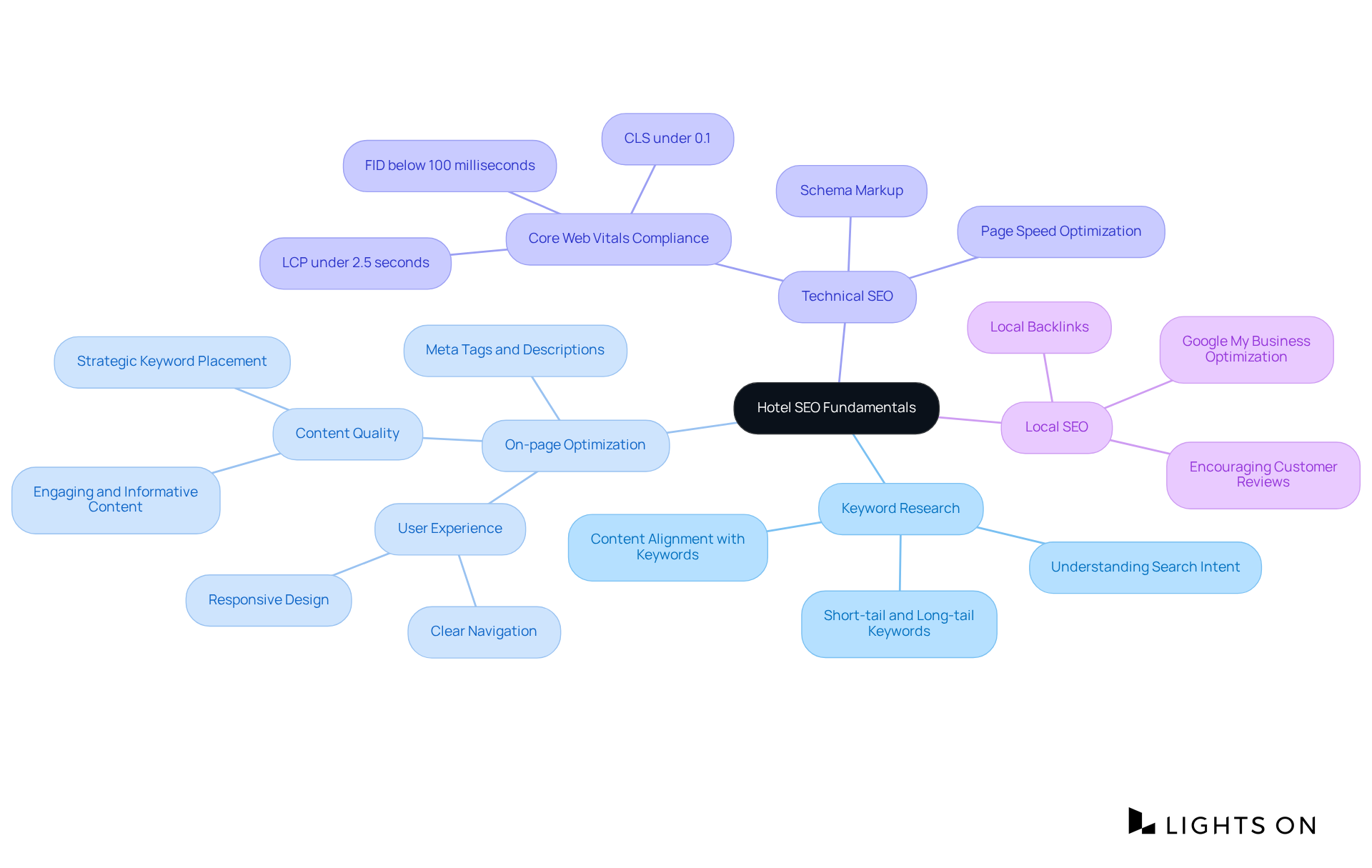
Optimizing title tags and meta descriptions is essential for effective on-page SEO for hotel businesses aiming to enhance their online visibility through SEO for hotel. To capture attention, consider these key practices:
Statistics indicate that 53.3% of all website traffic originates from organic inquiries, emphasizing the significance of optimizing these components. By applying these strategies for SEO for hotel, establishments can greatly enhance their opportunities for achieving higher positions in results, ultimately leading to increased traffic and reservations.
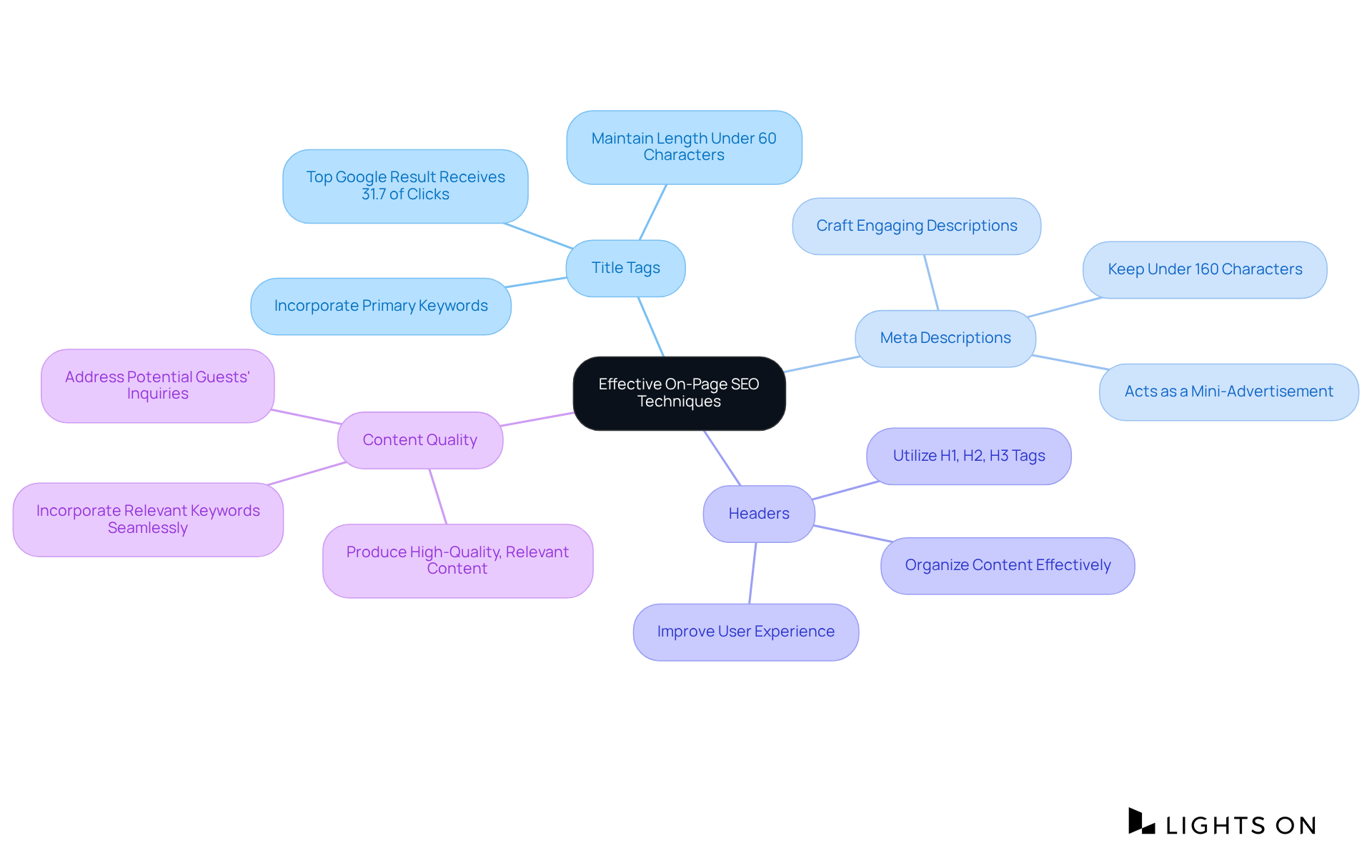
Local SEO for hotels is essential for enhancing their visibility when potential guests search for accommodations in the area. To effectively capture attention and generate interest, consider these key strategies:
By prioritizing SEO for hotels, accommodations can effectively connect with travelers actively seeking places to stay nearby, ultimately driving bookings and increasing revenue.
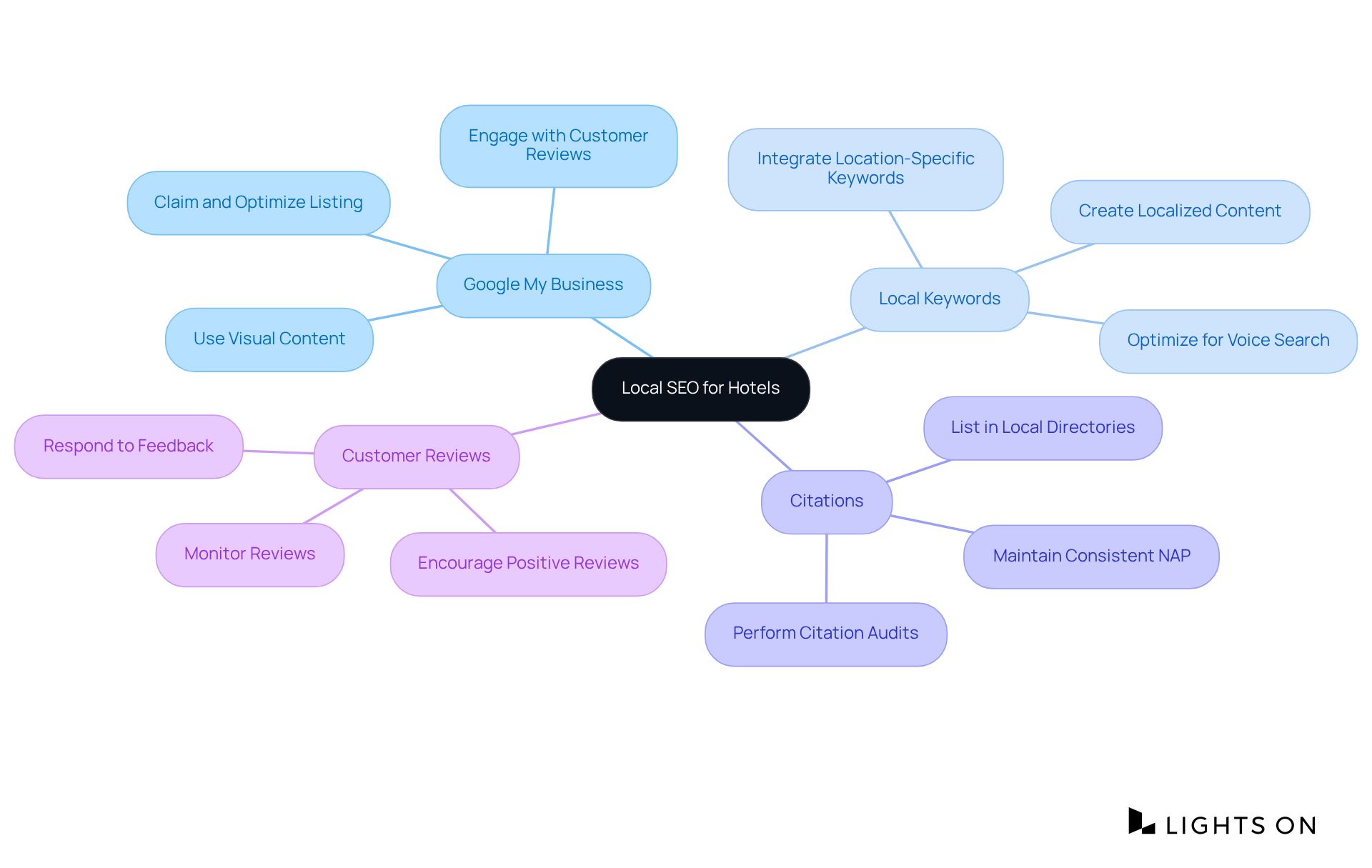
Content marketing is crucial for attracting and engaging potential guests through valuable and relevant content. To maximize effectiveness, consider these key strategies:
Link-building is equally vital for enhancing your establishment’s SEO for hotel purposes. Focus on acquiring backlinks from reputable sites to elevate your domain authority. This can be achieved through strategic partnerships, sponsorships, and crafting shareable content that resonates with your target audience. By implementing these strategies, accommodations can significantly bolster their online visibility and attract more visitors.
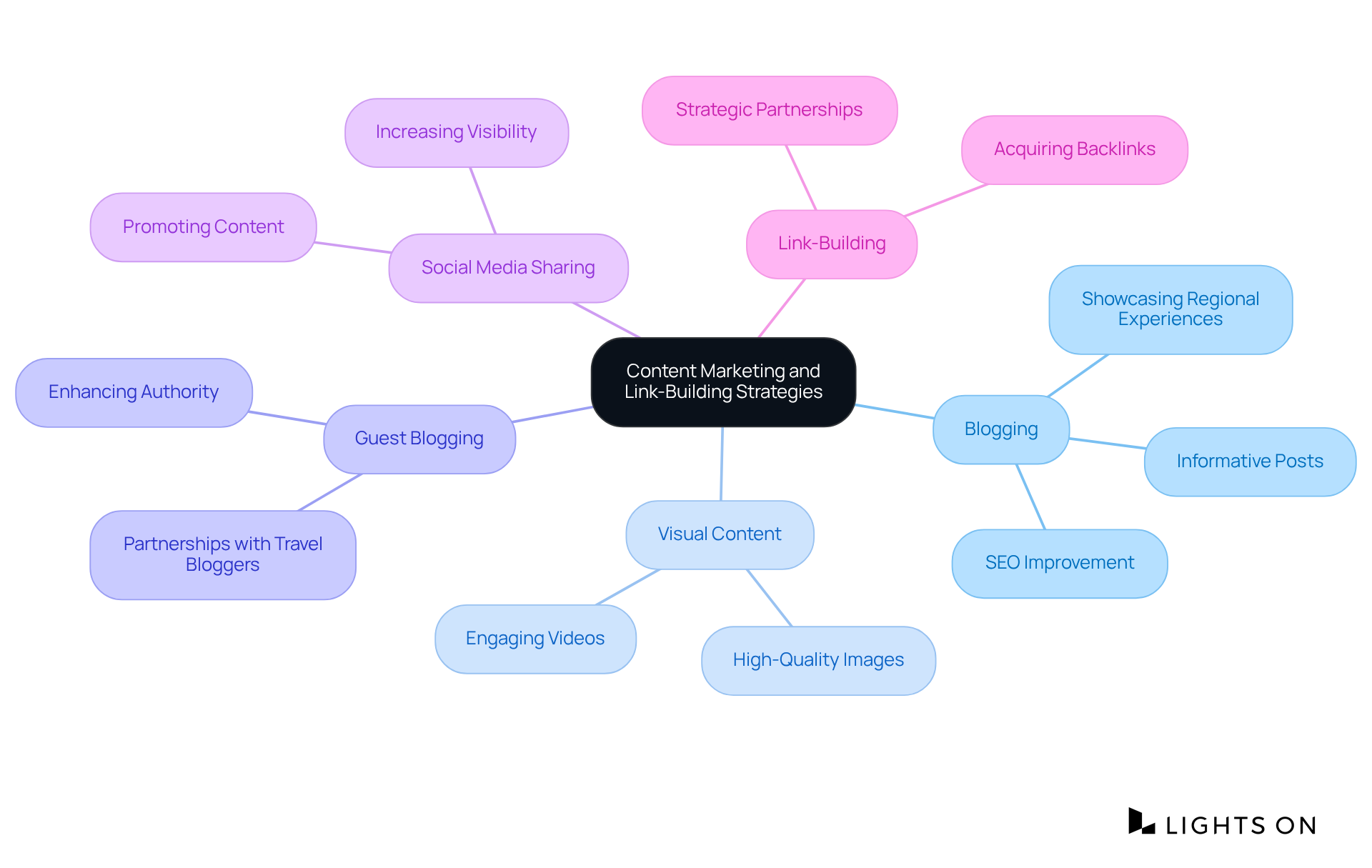
To ensure ongoing , continuous performance monitoring and strategic adaptation are crucial. Key practices include:
By consistently monitoring and adapting their SEO for hotel strategies, hotels can maintain a competitive edge and maximize their online visibility.
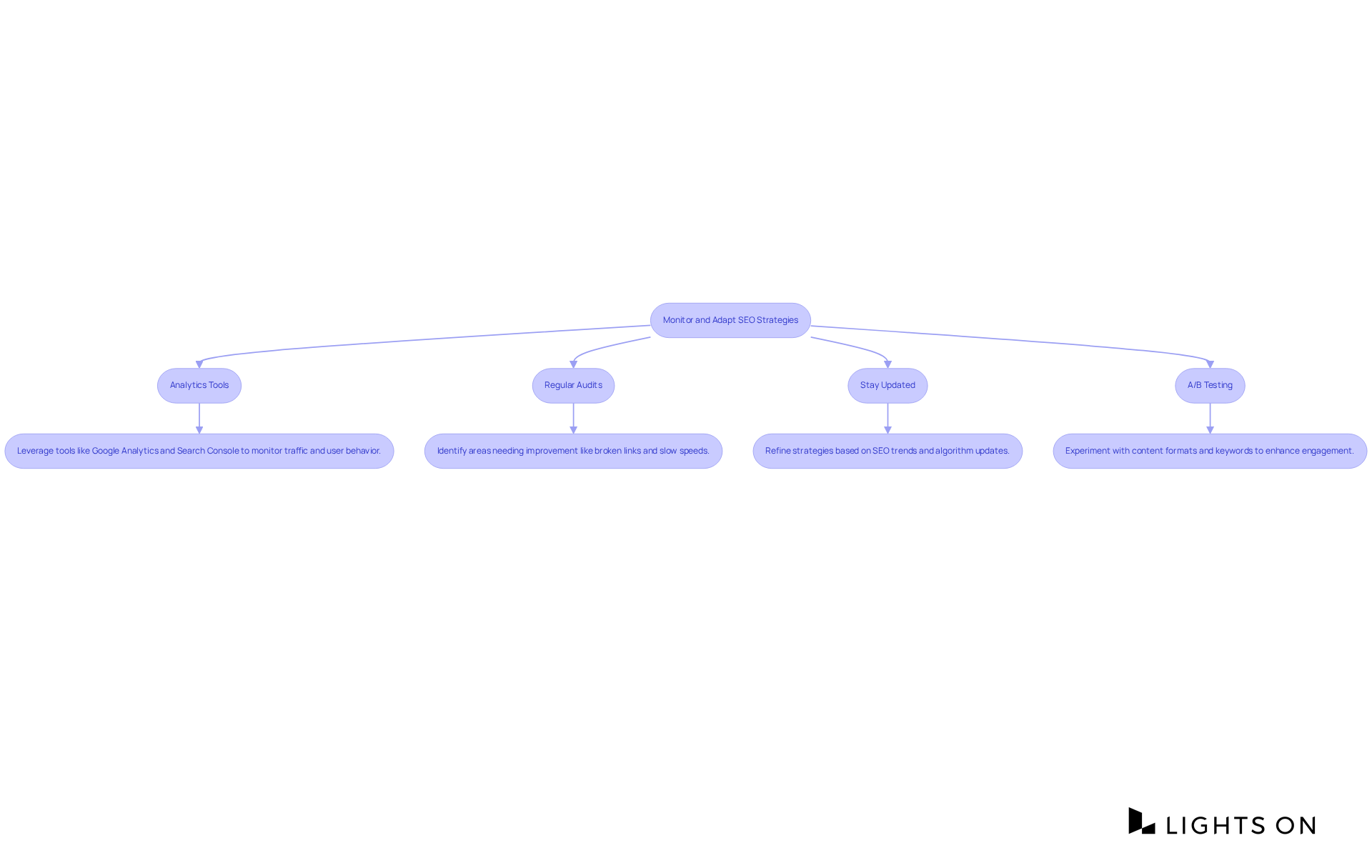
Enhancing a hotel's online presence through effective SEO strategies is essential for attracting potential guests and boosting bookings. By understanding and implementing the core components of hotel SEO—keyword research, on-page optimization, technical SEO, and local SEO—hotels can significantly improve their visibility in search results. A focus on user experience, mobile optimization, and engaging content further solidifies a hotel's position in the competitive online market.
Key insights include:
Regular monitoring and adaptation of SEO strategies ensure that hotels remain competitive and responsive to changing trends. By embracing these practices, accommodations can not only enhance their search rankings but also foster meaningful connections with potential guests.
Ultimately, the significance of mastering SEO for hotels cannot be overstated. As the online travel market continues to grow, the need for effective digital visibility becomes paramount. Property owners are encouraged to invest in SEO as a sustainable marketing strategy, ensuring their establishments thrive in an increasingly digital landscape.
What is the importance of SEO for hotels?
SEO for hotels is crucial for boosting visibility and attracting visitors to accommodation websites. It helps improve online presence and conversion rates by ensuring that potential guests can easily navigate the site and find information.
What are the key components of hotel SEO?
The key components of hotel SEO include keyword research, on-page optimization, technical SEO, and local SEO.
How does user experience affect hotel SEO?
User experience significantly influences a hotel's online presence and conversion rates. A user-friendly, fast, and mobile-optimized site is essential, as it enhances navigation and booking processes for potential guests.
What are some effective strategies for improving hotel SEO?
Effective strategies include optimizing page speed, ensuring mobile-friendliness, utilizing schema markup, and adhering to Core Web Vitals standards for better site performance.
How can keyword research enhance hotel SEO?
Keyword research helps identify relevant keywords that align with what travelers are searching for, leading to higher engagement and conversion rates. Understanding potential guests' search queries is fundamental for visibility in search results.
What role do title tags and meta descriptions play in on-page SEO for hotels?
Title tags should incorporate primary keywords and be under 60 characters to ensure proper display in search results. Meta descriptions should summarize the page content with relevant keywords, ideally under 160 characters, to improve click-through rates.
Why is content quality important for hotel SEO?
High-quality, relevant content that addresses potential guests' inquiries can enhance visibility rankings and engage visitors. It is crucial to incorporate relevant keywords seamlessly into the content for effective SEO.
How often should hotels conduct SEO audits?
Hotels should conduct quarterly or yearly SEO audits with a specialist to identify areas for improvement in their website's SEO performance and ensure their strategies remain effective.
What are Core Web Vitals, and why are they important?
Core Web Vitals are a set of metrics that measure user experience, including Largest Contentful Paint (LCP), First Input Delay (FID), and Cumulative Layout Shift (CLS). Adhering to these standards can significantly enhance user experience and site performance.
How does SEO compare to traditional advertising for hotels?
SEO is considered a more economical marketing approach compared to reliance on costly advertising campaigns, making it a wise investment for property owners to enhance visibility and boost bookings.
Transform your group booking strategies with Lights On and watch your occupancy soar.